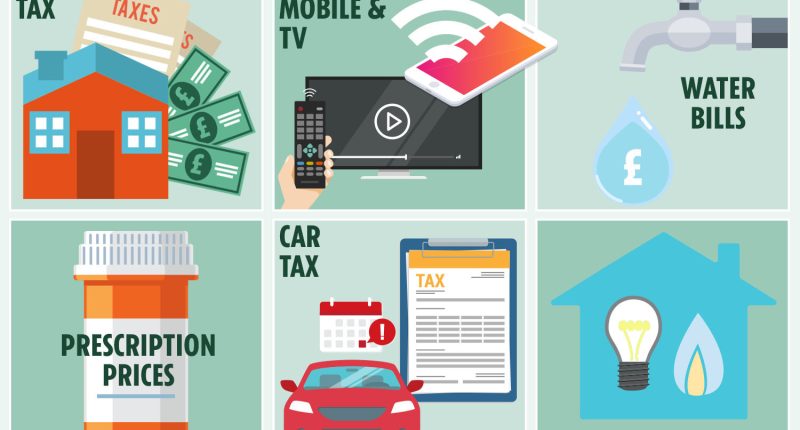MILLIONS are facing a barrage of bill hikes in the coming weeks – but there are ways to avoid paying more.
With the next tax year starting in April, many price increases will kick in soon, and billpayers need to be prepared.
However, it’s not all bad news as the National Living Wage for those over 21 will rise from £10.42 to £11.44 from April 1.
The government is also axing Class 2 National Insurance contributions (NICs) and cutting one percentage point off the rate charged for Class 4.
National Insurance is a tax paid on earnings, and these two changes combined will save two million self-employed workers £350 a year from April 1.
Benefit payments will rise by 6.7% from April, in line with the consumer price index (CPI) level of inflation for September 2023.
Read more in money
The payment boost means that the average family on Universal Credit will be around £470 a year better off.
But council tax, broadband, mobile and TV bills, are set to rise along with water bills, prescription charges and vehicle excise duty.
Another spot of good news is that energy bills are set to fall.
However, with the help of a few clever tricks, you can keep costs down.
Most read in Money
1. Broadband, TV and mobile price hikes – up to £50 a year
Millions of broadband, mobile and TV customers will be hit by huge bill hikes at the end of the month.
This is because telecom providers usually raise the prices of their contracts in the Spring.
Providers usually increase their prices annually based on the rate of inflation plus up to 3.9% more.
December’s CPI figure (4%) or January’s RPI figure (4.9%) are used by many mobile and broadband companies to hike prices.
The increases will come into effect for millions of customers on March 31 on April 1.
This means the new rate will kick in from your next bill after that date.
The increase will affect customers even if they’re signed up to a contract with a fixed price.
This is because many firms have mid-contract price rises written into their terms and conditions.
The exact amount more you’ll have to pay will depend on how much your bill is now but some will see their bills rise by up to £50 a year.
BT, EE and Plusnet will all hike customer charges on March 31.
The remaining telecom giants will raise charges on April 1.
We’ve previously revealed how much prices will rise under 11 different providers in the Spring.
How to beat it
The simplest way to save more of your hard-earned cash is by switching your supplier when your contract expires.
If you’re outside the minimum term of your contract, then you won’t need to pay a cancellation fee – and you might be able to find a cheaper deal elsewhere.
You might be charged an exit fee if you’re still in your contract period.
But don’t just switch contracts because the price is lower than you currently pay.
Look at how much speed you need for broadband, how many minutes and texts you need, and how much data you’re using on your mobile to find out which deal is best for you.
Use comparison websites like MoneySupermarket and Uswitch to compare the best tariffs and phone prices.
2. Council tax rises – up £103 a year
“Nearly all” local authorities in England and Wales will hike the tax by the maximum amount in April.
Of the 136 authorities which have already announced their council tax proposals for the coming year, 128 (94%) are looking to increase bills in April by 4.99%.
This is the largest amount allowed by the government without having to hold a local referendum.
At the same time last year 75% of councils intended to impose the maximum rise, according to the County Councils Network (CCN), which released the figures.
The 5% rise equates to £103.25 extra a year for the typical Band D property, which is currently £2,065.
Elsewhere, The Sun revealed earlier last month that certain areas have been handed special permission to hike bills by 10%, so the same annual bill could increase by £206.50.
Keep an eye on your council’s website for information on its budget plans for the 2024/25 financial year – which will include information on any rate hikes.
Check which council tax band your property falls under to work out how much the increase will cost you.
You can find your local authority by visiting www.gov.uk/find-local-council.
You’ll usually be sent a council tax bill in April outlining how much you need to pay.
Residents can choose to make payments over 10 months.
You can also opt to pay instalments over 12 months if you prefer.
How to beat it
There are several ways you can get discounts and reductions on your council tax bill.
In some cases, you can even get the bill completely wiped with a council tax reduction.
Factors such as your household income, whether you have children, and if you receive any benefits, will influence what you get.
To apply, visit https://www.gov.uk/apply-council-tax-reduction.
You’ll need your National Insurance number, bank statements, a recent payslip or letter from the Jobcentre, and a passport or driving licence when filling out the details.
Below, we reveal all the ways you can get discounts or a reduction on your bill:
Single person discount
If you live on your own, you can get 25% off your council tax bill.
This also applies if there is one adult and one student living together in a property, or if there is one adult and one person classed as severely mentally impaired in the home.
If you live with someone who doesn’t have to pay council tax, such as a carer or someone who is severely mentally impaired, you could get a larger reduction too, of up to 50%.
And, if you live in an all-student household, you could get a 100% discount.
Retirees
Pensioners may also find themselves eligible for a council tax reduction.
If you receive the Guarantee Credit element of Pension Credit, you could get a 100% discount.
If not, you could still get help if you have a low income and less than £16,000 in savings.
And a pensioner who lives alone will be entitled to a 25% discount too.
Low-income households
If you are on a low income or receiving benefits, you could be eligible for a reduction on your council tax.
Whether you are eligible will vary depending on where you live.
You could also get a deferral if you’re struggling to pay your bill, or you can speak to your council about setting up a payment plan to manage the cost.
But one thing to remember is if you are struggling you should contact your council as early as you can.
3. Water bill hikes – up £71 a year
Millions of households will see their water and sewerage bills rise by up to £71 a year from April 1.
Wessex Water and Anglian Water are at the top end of the scale, with average bills set to increase to £548 and £529, respectively, while Northumbrian customers will see the lowest average bills of £422.
Water UK said firms would invest a record £14.4 billion in return for customers’ money to ensure supply security and “significantly reduce” the amount of sewage in rivers and seas.
The rise comes amid ongoing regulatory concern over dividends paid out by water firms to shareholders amid the cost of living crisis and public fury about sewage overflows into waters.
Water UK said bills were rising less than in the previous financial year and argued that they would be around £60 higher today if they had kept pace with inflation since 2014.
How to beat it
It’s always worth checking if you qualify for a discount or extra support to help pay your water bill.
Over two million households who qualify to be on discounted social water tariffs aren’t claiming the savings provided, according to the Consumer Council for Water (CCW).
Only 1.3million households are currently issued with a social water tariff – up 19% from the previous year.
And the average household qualifying for the discounted water rates can slash their bills by £160 a year.
Every water company has a social tariff scheme which can help reduce your bills if you’re on a low income and the CCW is calling on customers to take advantage before bills rise in April.
Who’s eligible for help and the level of support offered varies depending on your water company.
Most suppliers also have a pot of money to dish out to thousands of customers who are under pressure from rising costs – and you don’t have to pay it back.
These grants can be worth hundreds of pounds offering a vital lifeline when faced with daunting water bills.
The exact amount you can get depends on where you live and your supplier, as well as your individual circumstances.
Many billpayers across the country could also get help paying off water debts through a little-known scheme and even get the balance written off.
Companies match the payments eligible customers make against the debt on their account to help clear it sooner.
If you’re on a water meter but find it hard to save water as you have a large family or water-dependent medical condition, you may be able to cap your bills through the WaterSure scheme.
Bills are capped at the average amount for your supplier, so the amount you could save will vary.
The Consumer Council for Water estimates that bills are reduced by £307 on average through the scheme.
4. Vehicle Excise Duty hike – up £10 a year
Last year, vehicle excise duty (VED) rates increased by 10.1% to keep in line with inflation.
HMRC has confirmed that the rates for each car tax band will increase again from April 2024.
This could be by as much as 6% given the UK’s recent high inflation levels, with experts predicting that the standard rate will rise from £180 to £190 from April.
Vehicle Excise Duty is an annual tax you have to pay to have your car on the road.
You have to pay the tax when the vehicle is first registered.
You then have to pay the tax from then on to maintain having your vehicle on the road.
The exact amount your VED will go up from April 1 depends on the type of vehicle you own, as you pay different amounts based on its weight.
Your rate is different based on when you registered your vehicle too.
The Chancellor usually confirms how much VED will increase by when he delivers his Spring Budget.
5. Prescription charges – April 1
Prescription charges usually rise every April in England and the Department of Health and Social Care sets the exact amount they rise by.
They rose from £9.35 to £9.65 per item in England last April.
The government hasn’t yet confirmed if prescription charges will rise in England this April – but it usually does after it’s delivered its Spring Budget.
Prescriptions remain free of charge in Northern Ireland, Scotland and Wales.
How to beat it
There are ways to save money on prescriptions, and in some cases get them for free.
f you live in England, you can get free prescriptions if you’re in one of the following groups:
- You’re aged 60 or over
- You’re aged under 16 or are 17 or 18 and in full-time education
- You’re pregnant or had a baby in the previous 12 months and have a valid maternity exemption certificate
- You have a specific medical condition and have valid medical exemption card
- You have a continuing physical disability that prevents you going out without help from another person and have a valid medical exemption certificate (MedEx)
- You hold a valid war pension exemption certificate and the prescription is for your accepted disability
- You are an NHS inpatient
You can also get free prescriptions if you or your partner are claiming certain benefits, or if you’re aged under 20 and dependent on someone claiming certain benefits, including:
- Income support
- Income-based jobseeker’s allowance
- Income-related employment and support allowance
- Pension credit
- Universal Credit and meet the criteria
You won’t always be eligible for free prescriptions if you are on Universal Credit, as it depends on your income.
You can also get free prescriptions if you are entitled to an NHS tax credit exemption certificate.
You qualify for one of these if you receive child tax credits or working tax credits (including a disability or severe disability element).
Those ineligible for free prescriptions can still make savings by purchasing a Prescription Prepayment Certificate (PPC).
It’s essentially a season ticket which you pay for once and you can use to cover any prescriptions you need for one year.
You can also get them to cover three months.
A one-year PPC costs £111.60, while a three-month PPC will set you back £31.25.
You can buy them on the NHS Business Services Authority’s website or via a registered pharmacy.
The point at which you start saving money with the three-month PPC is after buying four or more prescriptions.
With the one-year PPC, you start making savings after 12 or more purchases.
So, if you need a lot of prescriptions every year, a PPC can definitely be worth your time.
6. Energy bill change – April 1
Energy bills are set to fall by £238 a year for millions of households on April 1.
Ofgem’s energy price cap will fall from the current rate of £1,928 a year to £1,690 a year.
It means the average household could see their annual bill drop by £238.
But bear in mind that the price cap is reviewed every three months, so your annual bill could still change in the future.
The energy regulator said it will cut the price that a supplier can charge for gas from 7.42p per kWh today to 6.04p from April 1.
The price of electricity will fall from 28.62p per kWh to 24.50p, Ofgem said.
The standing charge, a fixed daily amount you have to pay for energy, no matter how much energy you use, is going up though.
For gas, standing charges are going up to 31.43p a day, from 29.6p currently – based on the average across England, Scotland and Wales.
The daily standing charge for electricity will rise to 60.1p a day, up from 53.35p.
It’s important to note, though, that the price cap is not a cap on the overall amount people will pay for their energy.
Instead, it caps the amount that they pay per kilowatt hour, or unit, of gas and electricity.
The figure is calculated based on what Ofgem thinks an average household will use.
This is calculated assuming that a typical household uses 2,700 kWh of electricity and 11,500 kWh of gas across a 12-month period.
Those who use less will pay less, and those who use more will pay more.










